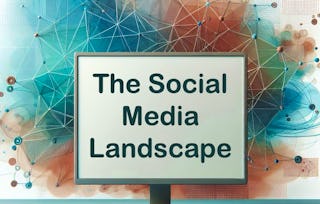Social media connects us across space and time, allowing us to find like-minded communities and participate creatively in public life as never before. We may often use social media without thinking much about the possible consequences. But there is a shadow side associated with social media use, which takes the form of hate speech, increased surveillance, lack of anonymity and questionable use of our data. What do we need to know to use social media spaces effectively, in a way that is safe and productive for all?

Ends soon: Gain next-level skills with Coursera Plus for $199 (regularly $399). Save now.

(114 reviews)
Skills you'll gain
Details to know

Add to your LinkedIn profile
See how employees at top companies are mastering in-demand skills

There are 5 modules in this course
In the introductory module, we will examine the concepts of being social, of self-representation, online identity and publishing. We will also look at how the social media technologies intersect with public and private spheres as networked communication develops.
What's included
10 videos2 readings1 assignment4 discussion prompts
We examine who the users of social media are, how they use it and their motivations. We will also look at the difference between networks and communities. Through the lens of 'produsage' we will explore participatory culture and understand the motivations behind users contributing to cultural production.
What's included
8 videos2 readings1 assignment1 peer review2 discussion prompts
Organisations are often accused of exploiting their users and online community members when they participate in collaborative cultural production activities. Similarly, participants are also accused of ignoring reciprocal efforts in collective online arrangements for personal gain, or what has recently been described as 'hope labour' (Kuehn & Corrigan, 2013). In this module, we will explore the tensions that surround precarious labour models for the productuon and consumption of social media content. In particular we will look at the concepts of cultural production, institutions, cultural intermediation, creativity and art.
What's included
9 videos2 readings1 assignment1 discussion prompt
Communication across social media platforms produces an enormous amount of data that can describe content, location, users, purchases, events and emotions, along with larger scale areas such as reactions to news and politics, integration with sporting events or information and knowledge exchange, Each of these instances provides an opportunity to understand both general patterns of large-scale communication alog with nuanced individual and niche communication spaces. This module provides the opportunity to identify this sort of data, how to access and collect it and interpret and display it to strategically target larger users and networks.
What's included
6 videos2 readings1 assignment1 peer review
Just because we can access social media doesn't mean that we should. In this module, you are asked to critically examine the use of social media and think about how you can manipulate the data in meaningful and beneficial ways compared with typical neo-liberal approaches. You are also encouraged to think about some of the not so obvious areas of social media data analytics, for example reconstructing potentially sensitive material, uncovering a dangerous conversation in social media, or exposjng users that may wish to remain incognito. Using social media data is tremendously rewarding, yet presents ethical challenges that many scholars are still grappling with.
What's included
6 videos1 reading1 assignment1 discussion prompt
Instructor

Offered by
Explore more from Governance and Society
 Status: Free Trial
Status: Free TrialUniversity of Colorado Boulder

Birla Institute of Technology & Science, Pilani
 Status: Preview
Status: PreviewHuddersfield Sandbox
 Status: Free Trial
Status: Free TrialUniversity of Colorado Boulder
Why people choose Coursera for their career




Learner reviews
114 reviews
- 5 stars
71.05%
- 4 stars
21.05%
- 3 stars
1.75%
- 2 stars
0.87%
- 1 star
5.26%
Showing 3 of 114
Reviewed on Jun 1, 2020
Very Good Course. I liked the content. The only difficulty I faced was the Forum was less active.
Reviewed on Sep 27, 2020
This was a very unique yet interesting course. I learnt a lot about things which seemed really trivial before!
Reviewed on Oct 26, 2022
it was awesome as i have an expanded knowledge in journalism ranging from face to face communication to social media communication.
Frequently asked questions
To access the course materials, assignments and to earn a Certificate, you will need to purchase the Certificate experience when you enroll in a course. You can try a Free Trial instead, or apply for Financial Aid. The course may offer 'Full Course, No Certificate' instead. This option lets you see all course materials, submit required assessments, and get a final grade. This also means that you will not be able to purchase a Certificate experience.
When you purchase a Certificate you get access to all course materials, including graded assignments. Upon completing the course, your electronic Certificate will be added to your Accomplishments page - from there, you can print your Certificate or add it to your LinkedIn profile.
Yes. In select learning programs, you can apply for financial aid or a scholarship if you can’t afford the enrollment fee. If fin aid or scholarship is available for your learning program selection, you’ll find a link to apply on the description page.
More questions
Financial aid available,
¹ Some assignments in this course are AI-graded. For these assignments, your data will be used in accordance with Coursera's Privacy Notice.





